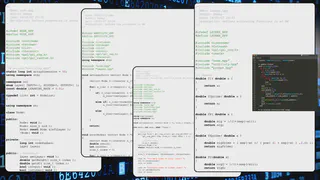The Intersection of AI, Physics, and the 2024 Nobel Prize

The announcement of the 2024 Nobel Prize in Physics honoring John Hopfield and Geoffrey Hinton had my phone blowing up with messages from friends in both the AI and Physics worlds. The reactions were quite interesting 🤭, sparking some engaging and lively discussions 🔥. I have to admit, I have mixed feelings about this win—definitely happy, but also reflecting on the broader implications of the Nobel Prize in Physics itself. It even made me curious enough to dig through my old files, and I found some of my earliest code from 2007, written in C++—a nostalgic reminder of where it all began for me!
Hopfield and Hinton’s contributions to machine learning, particularly artificial neural networks (ANNs), brought back so many memories from my MSc days in Physics. Under the guidance of Prof. Chris Monterola, we studied neural networks, learning about key concepts like backpropagation, learning rates, and activation functions. What fascinated me most was the connection between Hopfield networks and the Ising model from statistical mechanics—a beautiful example of how physics concepts could be applied to create powerful computational tools. Maybe it felt so natural because of my deep love for the elegance of statistical and computational physics, blending theory and computation in such a graceful way. Despite limited computational resources, we were integrating ANNs into our work, even while majoring in physics; or perhaps, especially because we were studying the physics of complexity?
Fast forward to today (post-𝘢𝘵𝘵𝘦𝘯𝘵𝘪𝘰𝘯 𝘪𝘴 𝘢𝘭𝘭 𝘺𝘰𝘶 𝘯𝘦𝘦𝘥), it’s incredible to see how far the field has come. The concepts we learned back then—associative memory, Boltzmann machines, and the like—have grown into something far larger than I ever could have imagined. Seeing these ideas now being recognized with the Nobel Prize is both inspiring and… surprising. 😋
For my students, in particular, this win somehow underscores the importance of mastering the basics—the fundamentals remain crucial, no matter what tools you have at your disposal. While the technology has advanced tremendously, those foundational principles are what drive breakthroughs.
So, congratulations to John Hopfield and Geoffrey Hinton, and kudos to the entire Physics and AI communities. I’m sure my group chats will be buzzing for a while as this conversation continues, haha!
P.S. If I find the time, I’ll elaborate more on these ideas and maybe unpack why it’s both strange and why it also makes sense that Hinton and Hopfield each won a Nobel Prize in Physics. Why Physics? Do they really warrant a Nobel?